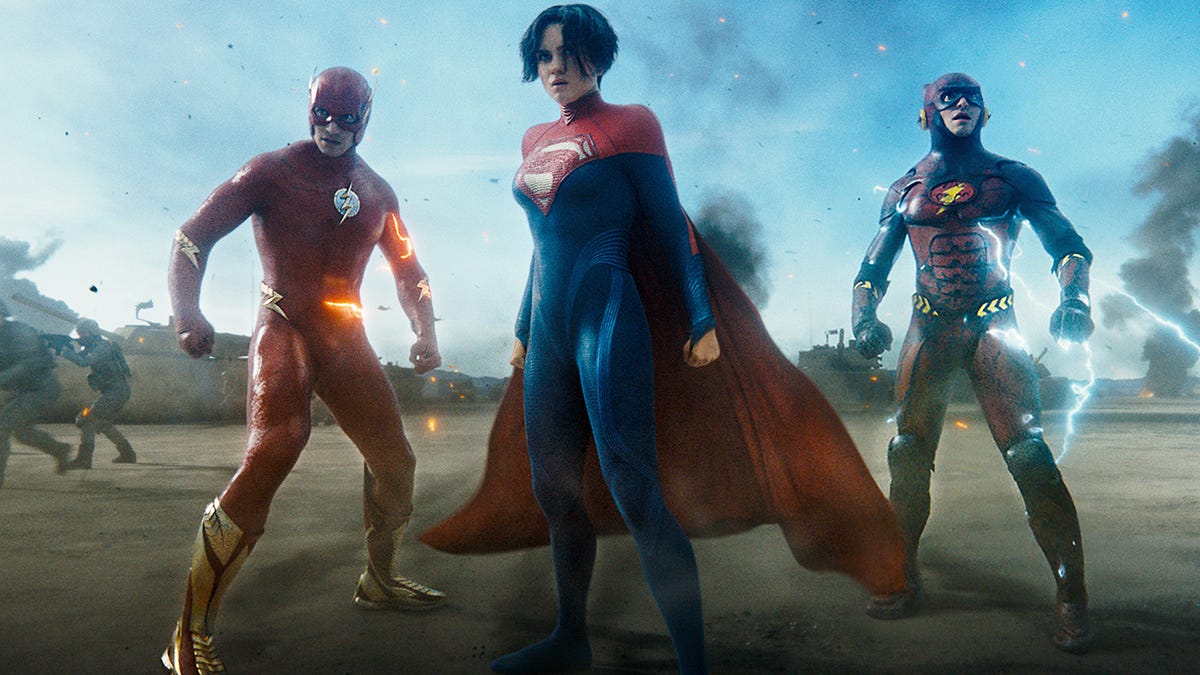The newest superhero movie isn’t especially good, but it is part of a good development: superhero movies either underperforming or straight-up bombing at the box office. Something that seemed all but unthinkable even a year or two ago — one or more of the various cinematic universes folding in on themselves like a collapsing star — now seems, if not exactly likely in the near future, as inevitable as the eventual heat death of the universe. What I will say for The Flash is that it made me care about Superman in a way I literally never have before, largely thanks to the performance of Sasha Calle as the woefully underused Supergirl.
Kara Zor-El doesn’t appear until the end of the second act and is given little to do beyond overcome her antipathy toward mankind after a single act of kindness, but she has a presence that neither her somehow-not-imprisoned co-star nor most other latter-day superheroes can match. Little about the maximalist approach of the multiverse era of storytelling we find ourselves in actually leaves you wanting more, but Calle proves the exception to the rule. (Heaven help me, I wouldn’t even mind seeing her in a standalone movie.) That, along with the latest ghoulish, computer-generated cameo from beyond the grave, inspired me to finally watch the 1978 Superman starring Christopher Reeve as the Man of Steel.
Directed by Richard Donner, who helmed The Omen two years earlier and moved on to the Lethal Weapon franchise after being unceremoniously let go from Superman II, it’s one of those movies you can feel occupying a bygone era as you watch it. Superman’s power comes both from its relative simplicity (can you imagine a contemporary comic-book movie being marketed with a poster reading “You’ll believe a man can fly”?) as well as how elemental it feels. Overlong prologue notwithstanding — and even that justifies its existence by featuring a post-Godfather and -Last Tango in Paris Marlon Brando as Jor-El — nothing about it feels inessential. Its influence on every movie of its kind that’s come since is immediately apparent, as is the fact that few of them have had as nonpareil a leading man as Reeve.
His embodiment of Kal-El/Clark Kent-Superman seamlessly blends otherworldly power with all-American wholesomeness in a way that’s far more appealing than it would have been had anyone else played him, including the many other actors who have. And while my expectations for the much-maligned Superman III and Superman IV: The Quest for Peace are not high, by which I mean I’m sure they’re terrible, I plan on watching them over the coming days solely to get the full experience of Reeve’s take on the character. (Also because I’m a mildly neurotic completist who doesn’t like watching part of a series without finishing it, but mostly the first thing.) Watching him in the first two films made me understand why there are so many Superman references in Seinfeld and why people are excited for this franchise to continue in some capacity.
I kept thinking how far these movies have strayed from what made them special in the first place: not the multiverse or an endless procession of good guys and bad guys to keep track of but the awe that comes from watching someone who represents the best of us perform heroic deeds. (Seriously, there aren’t nearly enough sequences where the hero in question rescues a cat from a tree or a baby from a burning building anymore.) These movies have become victims of their own success, stacking things ever higher and more perilously, and it’s all going to come toppling down eventually.
Your favorite version of a superhero is almost always the one you grew up with, and while there are surely countless articles comparing the relative merits of Michael Keaton and Christian Bale or Tobey Maguire and Tom Holland, it’s hard to imagine a similar debate taking place over Superman.







Well observed